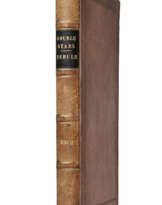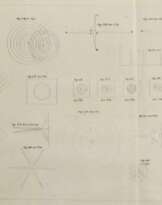ID 1032712
Лот 60 | On the current state of scientific research
Оценочная стоимость
$ 8 000 – 12 000
64 pages, 225 x 143 mm, with numerous insertions, deletions, and corrections. Blue paper-chemise and half black morocco clamshell.
Sir John Herschel’s draft of his remarkable inaugural presidential address delivered at the 1845 meeting of the British Association for the Advancement of Science at Cambridge University. Herschel presents a comprehensive survey of the state of the sciences, with particular emphasis on advances in mathematics, chemistry, astronomy, cosmology, physics, and the emerging science of thermodynamics. The draft differs importantly from his final, published text, including substantial passages that were deleted in the draft. Many of these deleted passages refer to named scientists, and render the Address much more detailed and specific in its references. Following his introductory remarks, Herschel discusses the advances recently made in mathematics, and in particular the work of Cayley, William Hamilton’s theory of quaternions, and George Boole’s investigations into mathematical logic: "Conceptions of a novel and refined kind have thus been introduced into analysis — new forms of imaginary expression rendered familiar — and a vein opened which I cannot but believe will terminate in some first-rate discovery in abstract science. Neither are inquiries into the logic of symbolic analysis ... devoid of a bearing on the progress even of physical science..." He goes on to discuss in particular The Cambridge Mathematical Journal, which published Boole’s most important papers.
He outlines a course of global scientific research in several areas, including geomagnetism and meteorology, and he emphasizes the importance of international co-operation and of long-term investment and patience in producing results. This is followed by a discussion of the economics of government sponsorship of scientific research, and its advantages to the nation. He focuses on the dual and sometimes conflicting necessities of amassing data, and the coherent analysis and reduction to theory of that data. "Witness the piles of unreduced meteorological observations which load our shelves and archives; witness the immense and admirably arranged catalogues of stars which have been and still are pouring in from all quarters upon our astronomy so soon as the want of extensive catalogues came to be felt and declared. What we now want is thought, steadily directed to single objects…."
"Speaking in a utilitarian point of view, the globe which we inhabit is quite as important a subject of scientific inquiry as the stars. We depend for our bread of life and every comfort on its climates and seasons, on the movements of its winds and waters. We guide ourselves over the ocean, when astronomical observations fail, by our knowledge of the laws of its magnetism; we learn the sublimest lessons from the records of its geological history; and the great facts which its figure, magnitude, and attraction, offer to mathematical inquiry, form the very basis of Astronomy itself." Herschel then discusses the invention and application of automatic recording devices and, alluding to the work of his colleague Charles Babbage, machines for performing arithmetic calculations and automatically recording their results, foreseeing how "these contrivances promise to become of immense utility." Herschel then considers the importance of voyages of exploration to scientific advance, and remarks that "a ship is an itinerant observatory…"
Being the premier astronomer of his time, Herschel (unsurprisingly) discusses at length advances in astronomy, and the outstanding problems needing resolution, particularly in relation to galaxies, the size and possible infinity of the universe, etc. Describing the newly completed six-foot reflector of the Earl of Rosse, Herschel considers the discoveries this new instrument might make. "I cannot help contemplating, as one of the grand fields open for discovery with such an instrument, those marvellous and mysterious bodies, the Nebulae. By far the major part, probably at least nine tenths, of the nebulous contents of the heavens consist of nebulae of spherical or elliptical forms presenting every variety of elongation and central condensation. Of these a great number have been resolved into distinct stars, and a vast multitude more have been found to present that mottled appearance which renders it almost a matter of certainty that an increase of optical power would show them to be similarly composed." He goes into considerable detail on the structure and constitution of nebulae, stars, and in particular his specialty, binary stars. "What are these mysterious families? Under what dynamical conditions do they subsist? Is it conceivable that they can exist at all, and endure under the Newtonian law of gravitation without perpetual collisions?" And he presents a model for a dynamic universe undergoing star formation and evolution: "The existence of a luminous matter, not congregated into massive bodies in the nature of stars, but disseminated through vast regions of space in a vaporous or cloud-like state, undergoing, or awaiting the slow press of aggregation into masses by the power of gravitation…" Several pages follow discussing the ‘Nebulous Hypothesis’ and the theories of Laplace.
Perhaps the most prescient and outstanding passages concerns the advance of science into the realms of the invisible and immaterial, and the advent of a post-Newtonian physics emerging from the science of thermodynamics: "The time seems to be approaching when a merely mechanical view of nature will become impossible — when the notion of accounting for all the phenomena of nature, and even of mere physics, by simple attractions and repulsions fixedly and unchangeably inherent in material centres (granting any conceivable system of Boscovichian alternations), will be deemed untenable. Already we have introduced the idea of heat atmospheres about particles to vary their repulsive forces according to definite laws."
Herschel then considers the idea of biological evolution — ideas that proved influential in Charles Darwin's subsequen work: "the successive appearance of races of organized beings on earth, and their disappearance, to give place to others, which Geology teaches us, is a result of some certain law of development, in virtue of which an unbroken chain of gradually exalted organization from the crystal to the globule, and thence, through the successive stages of the polypus, the mollusk, the insect, the fish, the reptile, the bird, and the beast, up to the monkey and the man (nay, for ought we know, even to the angel), has been (or remains to be) evolved."
The address concludes with this vision of the future of science: "It leads us to look onward, through the long vista of time, with chastened but confident assurance that science has still other and nobler work to do than any she has yet attempted; work which, before she is prepared to attempt, the minds of men must be prepared to receive the attempt, - prepared, I mean, by an entire conviction of the wisdom of her views, the purity of her objects, and the faithfulness of her disciples."
Hershel's address was published in the British Association’s Report of the Fifteenth meeting of the British Association for the Advancement of Science by John Murray in 1846, and reprinted in Herschel’s Essays from the Edinburgh and Quarterly Reviews, with Addresses and Other Pieces (1857), pp 634-682. Herschel gave this manuscript to Edward Everett (1794–1865), American politician and educator. He was at the time of this Address the US Ambassador to England. He served as a US Senator, US Secretary of State, Governor of Massachusetts, and President of Harvard. He was a famous orator and gave the opening speech at Gettysburg in 1863, preceding Lincoln’s Gettysburg Address. He was a friend and correspondent of Herschel, whom he met while serving as U.S. Ambassador. He was a skilled mathematician, and is famous for his quote: "In the pure mathematics we contemplate absolute truths which existed in the divine mind before the morning stars sang together, and which will continue to exist there when the last of their radiant host shall have fallen from heaven." Provenance: Edward Everett — purchased from his descendants by the consignor.
| Автор: | Джон Фредери́к Уильям Гершель (1792 - 1871) |
|---|---|
| Место происхождения: | Англия |
| Категория аукционного дома: | Письма, документы и рукописи, Медицина и наука |
| Автор: | Джон Фредери́к Уильям Гершель (1792 - 1871) |
|---|---|
| Место происхождения: | Англия |
| Категория аукционного дома: | Письма, документы и рукописи, Медицина и наука |
| Адрес торгов |
CHRISTIE'S 20 Rockefeller Plaza 10020 New York США | ||||||||||||||
|---|---|---|---|---|---|---|---|---|---|---|---|---|---|---|---|
| Предосмотр |
| ||||||||||||||
| Телефон | +1 212 636 2000 | ||||||||||||||
| Факс | +1 212 636 4930 | ||||||||||||||
| Условия использования | Условия использования | ||||||||||||||
| Транспортировка |
Почтовая служба Курьерская служба Самовывоз | ||||||||||||||
| Способы оплаты |
Банковский перевод | ||||||||||||||
| Часы работы | Часы работы
|






